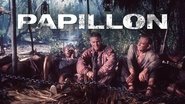DeuceWild_77
Frankin J. Schaffner was a great filmmaker, well known for his intense use of realism; his gritty, but stylish visual style; the innovative way of using the camera and, above all, his talented skills as a storyteller, responsible in commanding incredible screen epics such as "Planet of the Apes" ('68); "Patton" ('70); "Nicholas and Alexandra" ('71) and "The Boys from Brazil" ('78)."Papillon", from a screenplay penned by the ex-blacklisted, Dalton Trumbo & Lorenzo Semple Jr., based on the 1969 autobiography by the French convict, Henri Charrière, it's one of his best films, a genuine landmark on the "prison movies" sub-genre, as well one of the pinnacles of the 70's cinema.Its own realism is astonishing, since the very first scene when the viewer learn about those doomed men coming from all social classes, convicted to a strictly sentence on the French Guiana, an inhuman penal colony (located on the north Atlantic coast of South America in the Guyanas, an overseas department of France), Schaffner shot it in almost documentary style on the subject, the long way to their own personal hell.Among them, is our protagonist, an anti-hero that calls himself "Papillon" (the french word for "Butterfly"), a man wrongly accused to have killed a pimp, that refuses to be institutionalized and his determination to escape makes him to become friends with a popular forger, named Louis Dega, which have more (hidden) money to bribe and finance an escape, than courage itself.
The two will form a solid friendship that will last for almost two decades...Steve McQueen gives here his best on-screen performance of his short lived life, even better than his only Oscar nominated role in "The Sand Pebbles" ('66), he's impressive & amazing and totally believable as Charrière (even if he was almost 20 years older than the real "Papillon" when he arrived at the French Guiana) and as both a method and physical actor, he was not afraid to be filmed dirty, unshaven, covered in rags and even going to the mud of Kilo 40's filthiest swamp, in an excellently staged & shot scene, when both our protagonists are trying to catch a wounded, but furious alligator.McQueen surpassed himself here and delivered a 'tour de force' haunting performance that the viewer will never forget (Schaffner must have contributed to it, because as a great director of actors, he was responsible for four of his actors have been Oscar nominated: Lee Tracy in "The Best Man" ('64); George C. Scott in "Patton" ('70), which he won, but refused; Janet Suzman in "Nicholas and Alexandra" ('71) and Sir Laurence Olivier in "The Boys from Brazil" ('78), as well giving the glorious Chuck Heston a career resurgence in the critical acclaimed and box office hit, "Planet of the Apes" ('68). McQueen's snub for an Oscar nomination (he was nominated for the Golden Globe) may have been due to his affair with Ali MacGraw, then the wife of one of the most powerful producers in Hollywood, Robert Evans, and even if McQueen married her around the time "Papillon" was released, the bitterness of Evans may have cost him the deserved recognition.Dustin Hoffman, still fresh from his two Oscar nominated roles in "The Graduate" ('67) and "Midnight Cowboy" ('69), emerged as the new star for the 70's Era and also delivered an excellent performance as the cowardly submissive and resigned, Dega, in a unforgettable turn that also deserved more praise.The supporting cast delivers honest and reliable performances such as Don Gordon (one of McQueen's closest friends and his regular co-star) as the Ill-fated Julot; Woodrow Parfrey as Clusiot or an unrecognizable Anthony Zerbe in a sympathetic turn as Toussaint, the chief from the Leper Colony, the only man from the outside world that treated Charrière with dignity and respect (and vice versa).The cinematography and the peculiar camera angles used are top notch, we can feel the sweat from the convicts and the filth from the Penal Colony, as much as their desperation and the scenes with McQueen in the solitary confinement are among the best ever filmed in this sub-genre.Jerry Goldsmith, an usual colaborator of Schaffner, once again got an Oscar nomination for his memorable orchestration here and it's hard to believe that it was the only Oscar nomination that this masterpiece got.Some purists argue that the movie distances too much from the source material (Dega's involvement in the autobiography is way shorter), but books and movies are two different mediums, and it needed changes to work as a motion picture.In short, the "escape from / prison" movies, it's a sub-genre that fortunately, have lots of (near) masterpieces filmed, such as Jules Dassin' "Brute Force" ('48) & John Frankenheimer's "Birdman of Alcatraz" ('62) both starring Burt Lancaster; John Sturges' "The Great Escape" ('63) also with Steve McQueen; Stuart Rosenberg's "Cool Hand Luke" ('67) starring Paul Newman or Don Siegel's "Escape from Alcatraz" ('79) starring Clint Eastwood, but "Papillon" it's easily placed on the Top 5 of the whole lot, offering a thrilling and engaging experience, as well a profound and heart touching life journey about the perseverance of a human being, tested to the limit, who never gave up.As a footnote, this movie's distinctive visual style, cinematography and direction, influenced a lot of future productions, such as William Friedkin's "Sorcerer" ('77); Francis Ford Coppola's "Apocalypse Now" ('79) and even Steven Spielberg's "Raiders of the Lost Ark" ('81), among lots of others...




